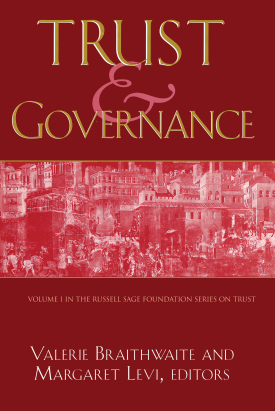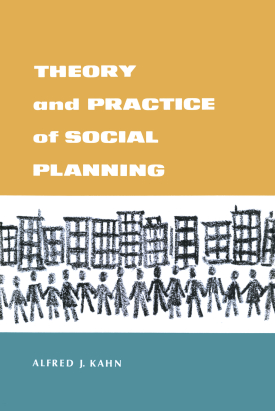
Theory and Practice of Social Planning
About This Book
Discusses the intellectual processes involved in social planning. Professor Kahn provides critical tools for the analysis of the planning process, and shows what social planning is and can be. Clarifying the major phases in the planning process, he shows how planning can succeed or fail at any one of these stages. He examined planners in their various roles: as "neutral" technicians and as advocates, as representatives of interest groups and as public officials.
The book describes both the social aspects of planning and the relationship between social and physical plans.
ALFRED J. KAHN was professor of Social Policy and Planning at the Columbia University School of Social Work.
Download
RSF Journal
View Book Series
Sign Up For Our Mailing List
Apply For Funding
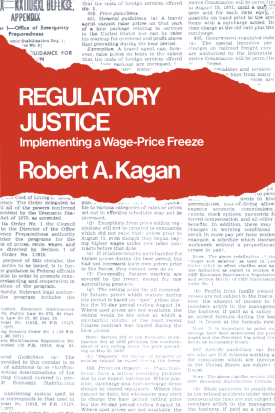
Regulatory Justice
About This Book
Regulatory Justice is based on a case study of two closely linked federal agencies—the Cost of Living Council (CLC) and the Office of Emergency Preparedness (OEP)—which administered a nationwide wage-price freeze in 1971.
ROBERT A. KAGAN is Professor of Political Science and Emanuel S. Heller Professor of Law at the University of California, Berkeley.
Download
RSF Journal
View Book Series
Sign Up For Our Mailing List
Apply For Funding
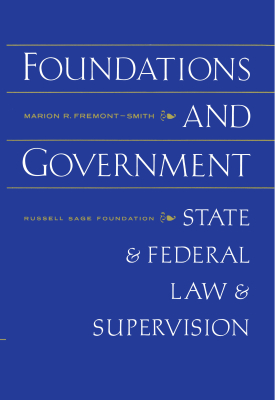
Foundations and Government
About This Book
Concentrates on the historical, statutory, judicial, and administrative aspects of philanthropic foundations. It begins with a general survey of the rise of foundations, particularly as a legal concept, and examines existing provisions for state registration and supervision, with special atention to the role of the attorney general. There are field reports on ten states with programs aimed at following charitable activities closely.
The concluding chapter provides appraisals and recommendations, and appendices include state legal requirements for charitable trusts and corporations, selected state acts, rules, reporting forms, and a list of cases.
MARION R. FREMONT-SMITH is a practicing attorney in Boston.
Download
RSF Journal
View Book Series
Sign Up For Our Mailing List
Apply For Funding

Surveying Subjective Phenomena, Volume 1
About This Book
In January 1980 a panel of distinguished social scientists and statisticians assembled at the National Academy of Sciences to begin a thorough review of the uses, reliability, and validity of surveys purporting to measure such subjective phenomena as attitudes, opinions, beliefs, and preferences. This review was prompted not only by the widespread use of survey results in both academic and non-academic settings, but also by a proliferation of apparent discrepancies in allegedly equivalent measurements and by growing public concern over the value of such measurements.
This two-volume report of the panel’s findings is certain to become one of the standard works in the field of survey measurement. Volume I summarizes the state of the art of surveying subjective phenomena, evaluates contemporary measurement programs, examines the uses and abuses of such surveys, and candidly assesses the problems affecting them. The panel also offers strategies for improving the quality and usefulness of subjective survey data. In volume II, individual panel members and other experts explore in greater depth particular theoretical and empirical topics relevant to the panel’s conclusions.
For social scientists and policymakers who conduct, analyze, and rely on surveys of the national state of mind, this comprehensive and current review will be an invaluable resource.
CHARLES F. TURNER is professor of Applied Social Research at the City University of New York.
ELIZABETH MARTIN is research associate at the National Research Council.
CONTRIBUTORS: Robert P. Abelson, Barbara A. Bailar, Marian Ballard, Theresa J. Demaio, Otis Dudley Duncan, Baruch Fischhoff, Lester R. Frankel, William H. Kruskal, Michael B. Mackuen, Catherine Marsch, Elizabeth Martin, Sara B. Nerlove, Howard Schuman, Tom W. Smith, Charles F. Turner
Download
RSF Journal
View Book Series
Sign Up For Our Mailing List
Apply For Funding
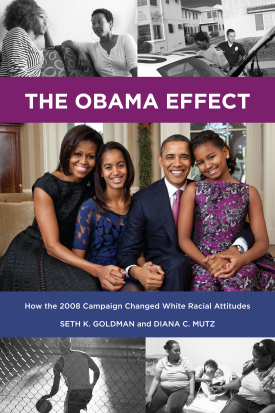
The Obama Effect
About This Book
Winner of the 2014 Frank Luther Mott-Kappa Tau Alpha Research Award
“Based on a unique sequence of national surveys tracking the 2008 presidential election, The Obama Effect is a breakthrough study. Vividly written, it simultaneously demonstrates the resilience of racial prejudice and the reality of racial progress.”
—PAUL SNIDERMAN, Fairleigh S. Dickinson Jr. Professor of Public Policy and senior fellow, Hoover Institution and the Freeman Spogli Institute for International Studies, Stanford University
“Seth Goldman and Diana Mutz’s rigorous demonstration of the positive Obama effect gives us reason for optimism that racial attitudes, although difficult to change, are nonetheless susceptible to conventional political communications and campaigns. This fine book also validates efforts to combat stereotypical portrayals in the media by showing the power of exemplary images and role models to influence how people think about race in this country.”
—DENNIS CHONG, chair and professor of political science, University of Southern California
Barack Obama’s historic 2008 campaign exposed many white Americans more than ever before to a black individual who defied negative stereotypes. While Obama’s politics divided voters, Americans uniformly perceived Obama as highly successful, intelligent, and charismatic. What effect, if any, did the innumerable images of Obama and his family have on racial attitudes among whites? In The Obama Effect, Seth K. Goldman and Diana C. Mutz uncover persuasive evidence that white racial prejudice toward blacks significantly declined during the Obama campaign. Their innovative research rigorously examines how racial attitudes form, and whether they can be changed for the better.
The Obama Effect draws from a survey of 20,000 people, whom the authors interviewed up to five times over the course of a year. This panel survey sets the volume apart from most research on racial attitudes. From the summer of 2008 through Obama’s inauguration in 2009, there was a gradual but clear trend toward lower levels of white prejudice against blacks. Goldman and Mutz argue that these changes occurred largely without people’s conscious awareness. Instead, as Obama became increasingly prominent in the media, he emerged as an “exemplar” that countered negative stereotypes in the minds of white Americans. Unfortunately, this change in attitudes did not last. By 2010, racial prejudice among whites had largely returned to pre-2008 levels. Mutz and Goldman argue that news coverage of Obama declined substantially after his election, allowing other, more negative images of African Americans to re-emerge in the media. The Obama Effect arrives at two key conclusions: Racial attitudes can change even within relatively short periods of time, and how African Americans are portrayed in the mass media affects how they change.
While Obama’s election did not usher in a “post-racial America,” The Obama Effect provides hopeful evidence that racial attitudes can—and, for a time, did—improve during Obama’s campaign. Engaging and thorough, this volume offers a new understanding of the relationship between the mass media and racial attitudes in America.
SETH K. GOLDMAN is Honors Assistant Professor of Communication at the University of Massachusetts, Amherst.
DIANA C. MUTZ is Samuel A. Stouffer Professor of Political Science and Communication at the University of Pennsylvania.
RSF Journal
View Book Series
Sign Up For Our Mailing List
Apply For Funding
About This Book
An effective democratic society depends on the confidence citizens place in their government. Payment of taxes, acceptance of legislative and judicial decisions, compliance with social service programs, and support of military objectives are but some examples of the need for public cooperation with state demands. At the same time, voters expect their officials to behave ethically and responsibly. To those seeking to understand—and to improve—this mutual responsiveness, Trust and Governance provides a wide-ranging inquiry into the role of trust in civic life.
Trust and Governance asks several important questions: Is trust really essential to good governance, or are strong laws more important? What leads people either to trust or to distrust government, and what makes officials decide to be trustworthy? Can too much trust render the public vulnerable to government corruption, and if so what safeguards are necessary? In approaching these questions, the contributors draw upon an abundance of historical and current resources to offer a variety of perspectives on the role of trust in government. For some, trust between citizens and government is a rational compact based on a fair exchange of information and the public's ability to evaluate government performance. Levi and Daunton each examine how the establishment of clear goals and accountability procedures within government agencies facilitates greater public commitment, evidence that a strong government can itself be a source of trust. Conversely, Jennings and Peel offer two cases in which loss of citizen confidence resulted from the administration of seemingly unresponsive, punitive social service programs.
Other contributors to Trust and Governance view trust as a social bonding, wherein the public's emotional investment in government becomes more important than their ability to measure its performance. The sense of being trusted by voters can itself be a powerful incentive for elected officials to behave ethically, as Blackburn, Brennan, and Pettit each demonstrate. Other authors explore how a sense of communal identity and shared values make citizens more likely to eschew their own self-interest and favor the government as a source of collective good. Underlying many of these essays is the assumption that regulatory institutions are necessary to protect citizens from the worst effects of misplaced trust. Trust and Governance offers evidence that the jurisdictional level at which people and government interact—be it federal, state, or local—is fundamental to whether trust is rationally or socially based. Although social trust is more prevalent at the local level, both forms of trust may be essential to a healthy society.
Enriched by perspectives from political science, sociology, psychology, economics, history, and philosophy, Trust and Governance opens a new dialogue on the role of trust in the vital relationship between citizenry and government.
VALERIE BRAITHWAITE is associate director of the Research School of Social Sciences at the Australian National University, Canberra, Australia. She is also coordinator of the Trust Strand of the Reshaping Australian Institutions Project in the Research School of Social Sciences.
MARGARET LEVI is professor of political science and Harry Bridges Chair in Labor Studies, University of Washington, Seattle. She is also director of the University of Washington Center for Labor Studies.
A Volume in the Russell Sage Foundation's Series on Trust
RSF Journal
View Book Series
Sign Up For Our Mailing List
Apply For Funding
Pagination
- Previous page
- Page 25
- Next page

